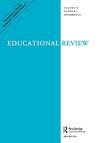“这是一个财务决定”:学生对新自由主义社会中基于信仰的非政府教育的道德理解
IF 3.4
3区 教育学
Q1 EDUCATION & EDUCATIONAL RESEARCH
引用次数: 0
摘要
作为市场化的非政府机构,宗教学校的扩张引发了伦理问题,包括它们对学生的吸引力。本文利用24名澳大利亚中学生的焦点小组来确定他们在新自由主义教育市场中对非政府信仰教育的看法中的道德美德,这种教育培养了一种相互冲突的道德品质,寻求对集体和个人目标做出反应。采用道德伦理的方法,本文描绘了学生如何将基于信仰的学校教育视为一项与正义、自我完善和勇气等美德相竞争的金融事业。首先,研究结果表明,学生们在道德上感到不安,因为在这些学校里,追求更公正的社会结果,讽刺的是,却导致了更大的不公正。具体地说,调查结果反映了学校强调费用/负担能力方案以提高入学机会与其影响之间的脱节,即在“富人”和“穷人”之间造成不公正的社会鸿沟。其次,一幅好坏参半的画面描绘了一些学生在以信仰为基础的学校空间中自我完善的良好行为,这种环境被视为“以客户为导向”的环境,应该为自己的优势加以利用,而另一些则说明了这样的系统实际上如何减轻了他们积极寻求提高技能和/或社会参与的需要。相应地,一些学生强调,在非政府的以信仰为基础的学校体系之外,他们如何“迫使”在学业上努力或在社会上积极主动——这被认为是在努力培养自我完善的美德。论文最后,学生们呼吁采取勇敢的行动,推动以信仰为基础的学校教育,以期促进更多负担得起的、公平的教育机会,并产生合乎道德的、社会公正的学校教育形式。本文章由计算机程序翻译,如有差异,请以英文原文为准。
“It’s a financial decision”: students’ ethical understandings of non-government faith-based schooling in a neoliberal society
The expansion of faith-based schools as marketised non-government institutions raises ethical questions, including their appeal to students. This article utilises focus groups with 24 Australian secondary students to identify ethical virtues in their perceptions of non-government faith-based schooling in a neoliberal education market cultivating a conflicting ethics character seeking to respond to both collective and individual goals. Taking the virtue ethics approach, the paper portrays how students perceive faith-based schooling as a financial enterprise contesting the virtues of justice, self-improvement, and courage. Firstly, findings illustrate students’ ethical discomfort with how a push for more socially just outcomes in such schools has, ironically, resulted in greater injustice. Specifically, findings capture a disjuncture between the schools’ emphasis on fee/affordability programmes for greater accessibility and their implications, i.e., the creation of unjust social divides between the “haves” and “have-nots”. Secondly, a mixed picture portrays some students’ virtuous behaviour of self-improvement in a faith-based schooling space seen as a “client”-oriented environment that should be utilised for one’s advantage, while others illustrate how such a system can, in fact, alleviate their need to actively seek to improve their skills and/or social engagement. Correspondingly, some students highlight how being outside the non-government faith-based schooling system “forces” them to strive academically or be socially proactive– regarded as working towards developing their virtue of self-improvement. The paper concludes with the students’ call for a courageous course of action for faith-based schooling, envisioned to promote more affordable and equitable educational opportunities and produce ethical forms of socially just schooling.
求助全文
通过发布文献求助,成功后即可免费获取论文全文。
去求助
来源期刊

Educational Review
EDUCATION & EDUCATIONAL RESEARCH-
CiteScore
7.90
自引率
3.00%
发文量
105
期刊介绍:
Educational Review is a leading journal for generic educational research and scholarship. For over seventy years it has offered scholarly analyses of global issues in all phases of education, formal and informal. It publishes peer-reviewed papers from international contributors across a range of education fields and or perspectives including pedagogy and the curriculum, history, philosophy, psychology, sociology, international and comparative education and educational leadership. Articles offer original insights to formal and informal educational policy, provision, processes and practice and the experiences of all those involved in many countries around the world. The editors welcome high quality, original papers which encourage and enhance debate on social justice and critical enquiry in education, besides innovative new theoretical and methodological scholarship. The journal offers six editions a year. The Board invites proposals for special editions as well as commissioning them.
 求助内容:
求助内容: 应助结果提醒方式:
应助结果提醒方式:


